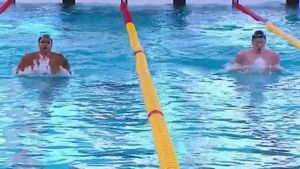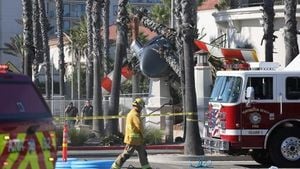Schools on the islands of Santorini and Amorgos are set to reopen on March 4, following proactive closure measures due to heightened seismic activity. This decision stems from increased earthquakes recorded since January 25, which prompted local authorities to prioritize student safety.
The return to classroom instruction marks the end of remote learning conducted via Webex since the closures were enacted by the Permanent Scientific Committee on Seismic Risk Assessment and the Monitoring Committee of the Greek Volcanic Arc. These bodies had recommended limiting large gatherings indoors and advised residents against accessing abandoned buildings and specific ports to prevent accidents during seismic events.
Officials concluded this move during a recent meeting attended by key government figures, including Minister of Climate Crisis and Civil Protection Vasilis Kikilias and Deputy Minister Evangelos Tournas. The session highlighted the necessity to evaluate the dangers tied to continued aftershocks from the earthquakes.
After thorough discussions, these committees unanimously agreed to allow schools to resume operations after the Clean Monday holiday, providing much-needed clarity for students and educators alike. A follow-up meeting is set for March 7 to reassess the situation and adjust safety protocols as needed.
The commitment to safety remains strong as both the government and scientific communities reinforce their guidance for residents. Citizens are urged to stay vigilant about potential aftershocks and adhere to established safety measures, which include identifying safe routes for movement and addressing any non-structural vulnerabilities within their homes.
This reopening is not just about returning to education; it's also about restoring normalcy within the community after the stress caused by the earthquakes. The decision aims to balance educational needs with health and safety concerns, ensuring students can learn without unnecessary risks.
Local parents have expressed relief at the development, feeling reassured about their children's safety as they return to school. "The decision to reopen schools was based on the latest evaluations of seismic risks," said Governor Basile Kikilia during the briefing, reflecting the careful consideration taken by officials.
Residents have been proactive following the earthquakes, conducting checks within their homes to mitigate potential hazards and prepare for unforeseen events. This community effort is part of broader recommendations from authorities aimed at enhancing overall safety during this period of instability.
With schools reopening, local businesses and families are hopeful for revitalization of community engagement and support systems. Enhanced safety protocols put forth will guide the residents, particularly as they navigate the challenges presented by natural phenomena.
The situation remains dynamic, and authorities continue to monitor seismic activity. With the planned reassessment on March 7, the local government aims to maintain open lines of communication with the community, ensuring they remain informed and safe.
Returning to class offers more than just academic lessons; it signifies resilience and recovery for the people of Santorini and Amorgos. Students, educators, and families alike are rallying together, demonstrating their strength and commitment to overcome the recent challenges posed by nature.
This event serves as yet another reminder of the importance of community and the effectiveness of collective efforts, especially during times of crisis.



